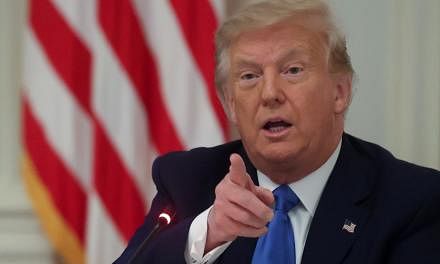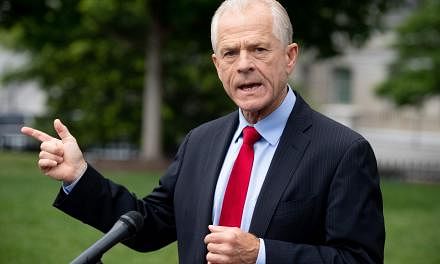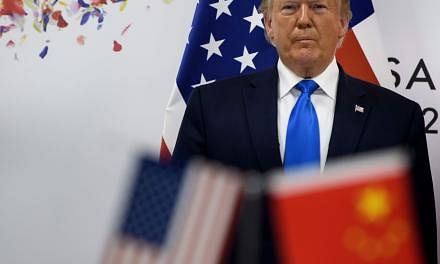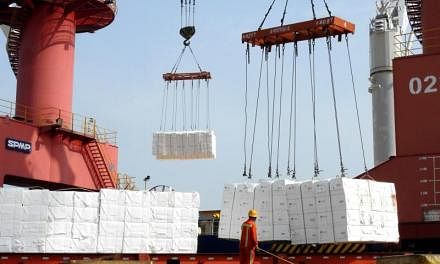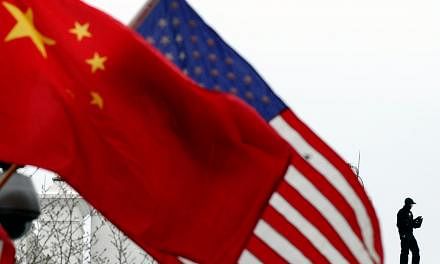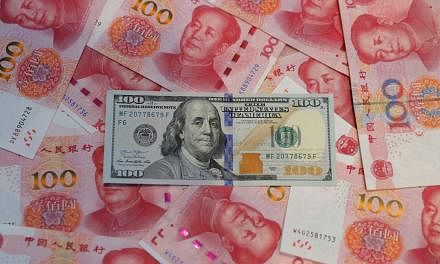WASHINGTON - Public attitudes in the United States towards China have turned negative, with more Americans now seeing China as a threat, a new Pew Research Centre survey has found.
Amid US-China tension - particularly over trade, technology and market access in China - unfavourable opinions of China have reached a 14-year high, the non-partisan research organisation found.
"Today, 60 per cent of Americans have an unfavourable opinion of China, up from 47 per cent in 2018," Pew Research said.
Almost a quarter of Americans - 24 per cent - named China as the country or group that poses the greatest threat to the United States in the future. This is twice as many as said the same in 2007, and ties China with Russia as the country or group most cited as a threat to the US.
The only other country to measure in double digits is North Korea at 12 per cent.
President Donald Trump claims China has been taking advantage of the United States' open markets and consumers for decades, and has stolen technology.
Early in his presidency he slapped tariffs on selected imports from China, prompting China to retaliate. The tariff war has steadily escalated and there is currently no end in sight.
Unsurprisingly therefore, the Pew Research survey of 1,503 adults, conducted in May and June, found wide concern about the state of the bilateral relationship.
But "while people… increasingly see China as a potential adversary, they do not necessarily think China's growing economy is bad for the United States," Pew Research said.
"Rather, more Americans say China's growing economy is good for the US than that it is bad (50 per cent v 41 per cent respectively).
"But, when it comes to China's increasing military strength, opinion is more uniformly critical: 81 per cent of Americans think China's growing military power is bad for the US."
Older people tended to have a less favourable view of China, Pew Research noted.
While Republicans and Democrats largely agree on how China's growing economy and military will affect the US, and both Republicans and Democrats have unfavourable views of China, Republican opinions are somewhat more negative.
Seventy per cent of Republicans and independents who lean Republican have an unfavourable opinion of China today, up from 51 per cent in 2018.
Among Democrats and Democratic-leaning independents, the figure was 59 per cent, up from 47 per cent in 2018.
Republicans are also more than twice as likely to name China as a threat as they are any other country (32 per cent), while 36 per cent of Democrats name Russia, and 19 per cent name China, as the most threatening country.

"Republicans and Republican-leaning independents have become particularly negative in their evaluations of China," Pew Research said.
This would appear to reinforce the presumed logic of China in waiting out President Trump in the hope he will lose an election in 2020, and a new Democrat administration would be less antagonistic - an assumption President Trump has himself made.
"Increased negativity toward China is hardly surprising," Dr Charles Bullock, professor of political science at the University of Georgia told The Straits Times.
"President Trump has been bashing China for much of his tenure and has gotten heavy media coverage each time he has raised tariffs on Chinese products.
"Many farmers as well as those who depend on exports from China are feeling the economic pinch of Trump's trade war so they have a personal reason to be critical of China."
An interesting anomaly however, and one not captured by the Pew poll, is that many farmers who are hurting because China is no longer buying their products remain committed to Trump, Dr Bullock said.
"Rather than blame the President they may be displacing the anger and fear over their economic plight on to the Chinese," he said.
But while there is probably "some Trump effect on increased negativity toward China," long-term data shows that since 2009 Republicans have usually been 10 percentage points or more negative to China than Democrats, he said.
"More aware Americans - those with college educations and those who are older - are more likely to see China as a problem," Dr Bullock said.
Dr Paul Sullivan, a Middle East and energy expert at Georgetown University, was also not surprised.
"The threatening military and other moves by China towards the US and its allies added to the constant drumbeat of anti-China rhetoric from politicians and the chattering class have had a great effect on public opinion," he said.
Many Americans saw China as a threat to their personal finances, blaming China for job losses and technology and intellectual property theft.
Ms Yun Sun, director of the China Programme at the Stimson Centre, a Washington think tank, told The Straits Times "The theme of great power competition and the reality of the trade war… are having their impact on American public opinion."
But she noted that the general view that China's growth is good for the US was in conflict with the view that China is a threat for the US. "It suggests that Americans have not completely figured out how to coexist with China - through competition or engagement," she said.



